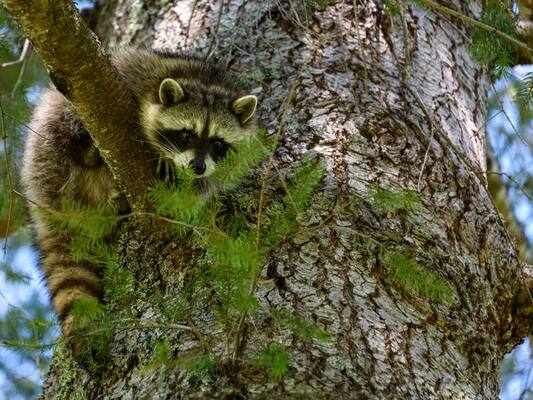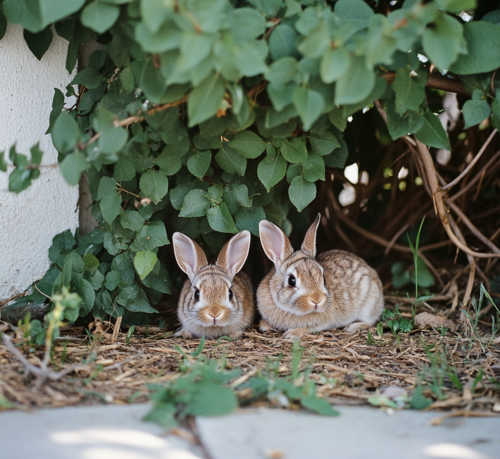Wildlife in Urban Forests

Introduction
Urban forests in the San Francisco Bay Area, like in many cities, are teeming with life. For arborists at Arborist Now, working in these environments often means encountering a variety of wildlife, each with its own habits and needs. While these interactions can be fascinating, they also pose challenges for both the arborist and the animals, making it essential to approach tree care with an understanding of urban ecology.

An Empty Bird Nest Hidden in Dense Foliage
The Role of Trees in Urban Ecosystems
Trees play a pivotal role in urban ecosystems, serving as more than just aesthetic additions to neighborhoods. They provide shelter, food, and nesting materials to countless species. Birds, raccoons, squirrels, rats, bees, and other wildlife rely on trees to meet their survival needs. For instance, cavities in older or decaying trees often become ideal nesting spots for birds and small mammals. These natural hideaways offer protection from predators and harsh weather, making them highly sought after in urban environments.
Similarly, trees act as food sources, offering fruits, seeds, and nectar. Bees, for example, are drawn to flowering trees, while birds may feed on berries or insects that inhabit the bark. This intricate web of dependencies highlights the critical role trees play in maintaining biodiversity within urban settings.
Arborists and the Challenge of Wildlife Encounters
For arborists, these wildlife interactions often present both risks and responsibilities. Older, larger trees, which are preferred by animals for nesting, are also the ones arborists frequently address due to safety concerns. Trees with cavities or signs of decay can pose a hazard to the public, as they are more prone to falling. This overlap means arborists must always be vigilant when performing tree care, especially during nesting season.
One of the first steps Arborist Now takes before climbing a tree is to perform a thorough visual inspection from the ground. This includes scanning for signs of nests, active wildlife, or other indicators of animal presence. Recognizing these signs early helps arborists plan their work carefully, avoiding unnecessary disturbances to the animals that call these trees home.
The Importance of Nesting Season Awareness
Nesting season is a particularly sensitive time for urban wildlife. Typically spanning the spring and summer months, this period sees birds and mammals building their homes and raising their young. Animals gather natural materials like twigs, lichens, bark, and leaves to craft intricate nests, ensuring a safe environment for their offspring.
For arborists, understanding the timing and significance of nesting season is critical. Encountering an active nest with eggs or young demands immediate action to ensure both the animals’ safety and compliance with wildlife protection laws. At Arborist Now, our standard practice involves stepping away from trees with active nests and scheduling work for a later date when the nest is vacated. This approach minimizes stress on the animals and avoids disrupting their reproductive cycle.
Best Practices for Protecting Urban Wildlife

Two Baby Rabbits Taking Shelter Under a Bush
To ensure tree care is conducted responsibly, Arborist Now follows a set of best practices aimed at protecting wildlife in urban settings:
1. Pre-Work Assessments
Arborists visually inspect trees for signs of wildlife activity, such as nests, burrows, or animal movement, before beginning any work.
2. Seasonal Considerations
During nesting season, extra precautions are taken to avoid disturbing active nests. Tree work is delayed if necessary to protect young animals.
3. Collaborating with Wildlife Experts
In some cases, arborists may consult local wildlife experts or organizations to address specific concerns, such as safely relocating a nest or ensuring the well-being of injured animals.
4. Educating the Community
Arborist Now also takes the opportunity to educate clients and the community about the importance of urban wildlife conservation. Understanding how trees support biodiversity encourages responsible tree care practices among homeowners and property managers.
Coexisting with Urban Wildlife
Urban wildlife and arborists will always share a close relationship, especially in a biodiverse region like the San Francisco Bay Area. At Arborist Now, we strive to balance the needs of urban wildlife with the safety and aesthetic goals of our clients. By taking a thoughtful and proactive approach, we ensure that our work supports the health of trees and the ecosystems they nurture.
Whether it's spotting a raccoon nestled in a tree cavity or stepping back from a nest to allow a family of birds to thrive, these moments remind us of the vital role trees play in urban life. They are not just part of the scenery; they are lifelines for the animals that inhabit our cities, and it is our responsibility to protect them.
By prioritizing safety, education, and awareness, Arborist Now helps create a sustainable urban environment where both humans and wildlife can coexist harmoniously.
Originally published on July 24, 2018.





